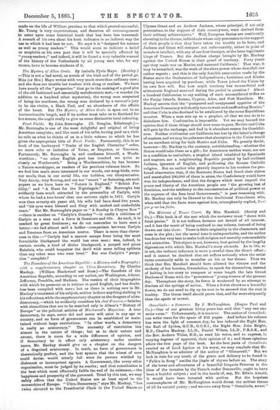Fresh Fields. By John Burroughs. (D. Douglas, Edinburgh.)— Mr. Burroughs
is one of the most delightful and original of living American essayists ; and like most of his tribe, haring paid us a visit; he tells us what be thinks of as in a little volume to which he has given the appropriate title of Fresh Fields. Fortunately, this is no book of the hackneyed "Traits of the English Character" order, no mere echo or imitation of Taine, or Esquiros, or Emerson. Fortunately, Mr. Burroughs is, and confesses himself, a Words- worthian ; "no other English poet has touched me quite so closely as Wordsworth." Being a Wordsworthian, he has become a Nature-worshipper, as readers of his previous volumes know. So we find him much more interested in our woods, our song.birds, even our snails, than in our social life, our hobbies, our idiosyncrasies. Very dainty, very flowing, and not too " smart " or flattering, are such papers as we have here on "Nature in England," "British Fer- tility," and "A Hunt for the Nightingale." Mr. Burroughs has evidently been much attracted by the personality of Carlyle, with whom he had a two hours' chat one autumn night in 1871. Carlyle was then seventy-six years old, his wife had been dead five years, and "his eyes were bleared and filmy with unshed and umshedable tears." But Mr. Burroughs's paper on "A _Sunday in Cheyne Row" —there is another on " Carlyle's Country "—is really a criticism of Carlyle as a man and a force in literature and life. As each, it is marked by great freshness ; we do not remember to have seen a better—we had almost said a bolder—comparison between Carlyle and Emerson from an American source. There is more than clever- ness in this :—" Carlyle had a narrow escape from being the most formidable blackguard - the world has ever seen ; was, indeed, in certain moods, a kind of divine blackguard, a purged and pious Rabelais, who could bespatter the devil with more telling epithets than any other man who ever lived." But was Carlyle's " purga- tion " complete ?






































 Previous page
Previous page